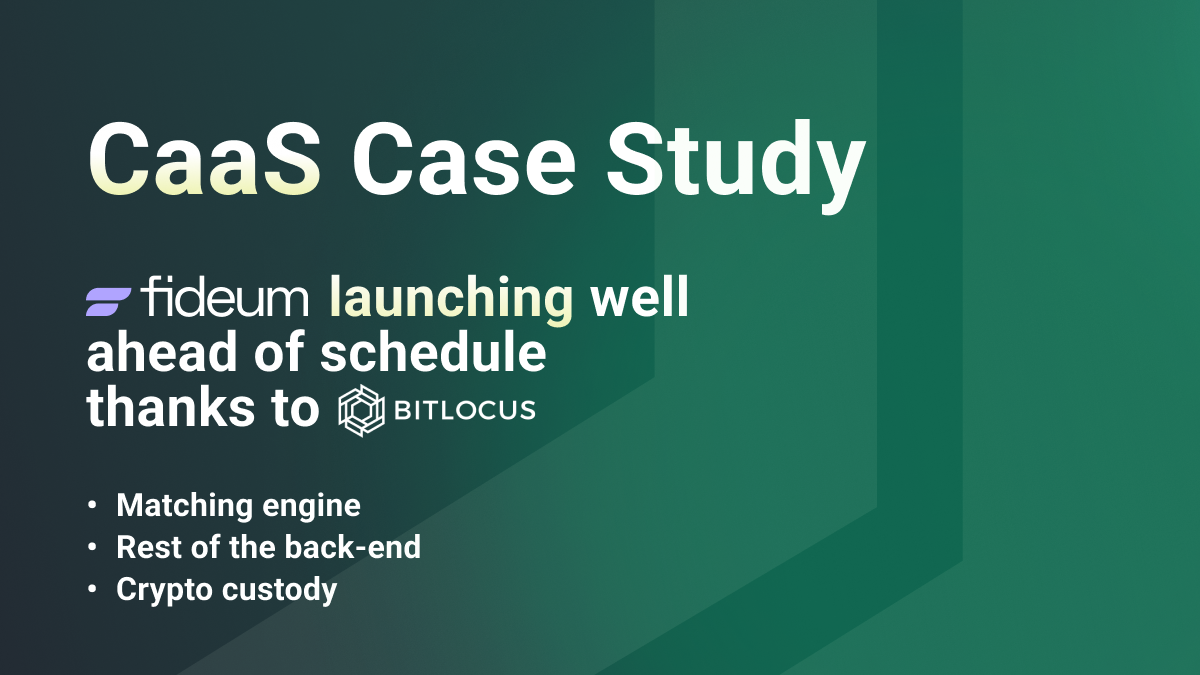
Launching crypto-based applications presents a wide range of unique challenges. This is especially true for instances where companies and developers are building solutions from the ground up, using internal resources.
Due to the expertise and development time required, launching an MVP can cost upwards of hundreds of thousands of dollars, barring smaller and mid-size companies from entering the market.
However, an alternative approach in the form of Crypto-as-a-Service (CaaS), championed by the likes of Bitlocus, can assist in sidestepping these challenges. To demonstrate, we'll use the example of Fideum (formerly Blockbank), which successfully launched crypto operations in record time with minimal resources.
About Fideum
Fideum is an all-in-one banking platform focused on simplifying the management of crypto assets by helping users track, trade, and analyze their portfolios. In addition to enabling staking directly through the platform, the current iteration of the platform (built using Bitlocus API) is characterized by state-of-the-art security features.
A one-stop solution for all DeFI activities, Fideum also created its own crypto wallet, thus streamlining access to centralized and decentralized financial options for its users.
The challenge
The team behind Fideum had a clear vision of their offering from the very start. With a defined road map in relation to the user flow and a well-thought-out UI/UX, they were well aware of the challenges they would face.
Launching quickly and building a user base was a major part of their agenda, yet, the features for a secure and compliant crypto platform generally require extensive resources. This includes specialized staffing, obtaining licenses, setting up various EMI or bank accounts, integrating wallets, and ensuring KYC/AML compliance.
Projections showed that if Fideum were to launch its solution from scratch, it would require a budget exceeding hundreds of thousands of euros. More concerningly, the time to launch was estimated at anywhere between 6 to 12 months, potentially halting the momentum of the entire project.
Thus, a fast launch was out of the question, and so was the process of attracting consistent users.
The solution
As a CaaS provider, Bitlocus offers clients a ready-to-use solution in the form of a comprehensive suite of services delivered via API, such as:
- Specialized staff with expertise in crypto exchanges (developers, compliance experts, and account managers)
- Licensing services
- Fiat on- and off-ramps for depositing/withdrawing fiat currencies (USD, EUR, etc.)
- KYC/AML services
- Solutions for listing on major markets, liquidity, and a matching engine
- Crypto transfers and wallet infrastructure (direct chain integrations and Fireblocks)
Using Bitlocus' existing infrastructure, Fideum was able to develop its solution while also reducing operational costs, saving time on multiple integrations, and dealing with a variety of different compliance setups.
In fact, by working with a single API, the process was drastically simplified, making it possible for even junior developers to set up a brand-new platform.
The results
By relying on Bitlocus, Fideum was able to accelerate its go-to-market timeline, launching well ahead of schedule without facing any additional challenges.
Instead of possibly taking up to a year to launch such a complex platform, Fideum shortened the entire developmental roadmap to just two months. This allowed them to test out the full functionality of their solution, while also implementing their business idea in record time, thus supporting continued growth and a more favorable market position.
On the fiscal side of things, Fideum reported a great increase in its overall ROI by minimizing its development costs. In addition to reaping the rewards of an accelerated launch, the company saved resources on staffing, licensing, consulting, and acquiring tools from multiple providers.
It’s also worth noting that CaaS providers charge a single monthly fee, thus allowing clients to accurately budget their expenses. This is a stark contrast to in-house development as the expenses tend to spiral out of control due to unanticipated circumstances or more complex budgeting.
Bitlocus offered ongoing support, assisting Fideum with maintenance and troubleshooting. With guidance that continued after the development process, the clients in this case successfully scaled their operation and expanded list of services.
Conclusion
By successfully eliminating the major pitfalls of developing crypto-based applications, Bitlocus and similar CaaS providers are a perfect solution for challenging developmental cycles in the blockchain industry.
Even though plenty of companies are interested in entering the market, their attempts are often boggled down by the reality of the complexities involved in crypto development. The alternative approach that relies on pre-made APIs developed by CaaS providers significantly lowers the entry barrier into the blockchain space.
Ultimately, such an approach can expand the reach of the entire industry, and possibly fuel and support further innovation in the field.